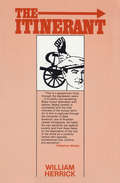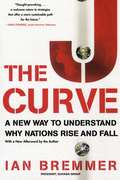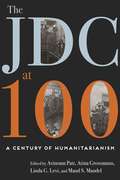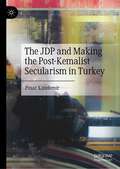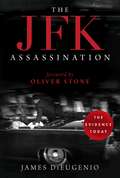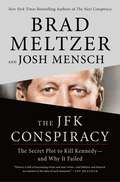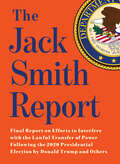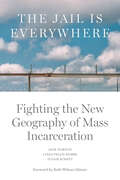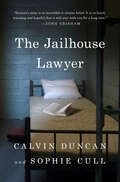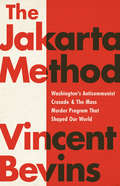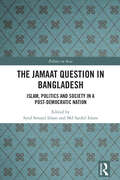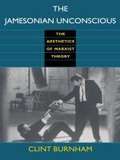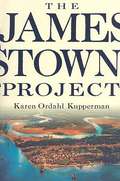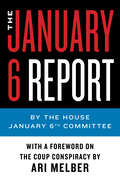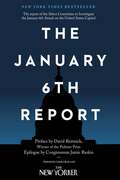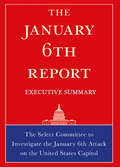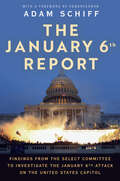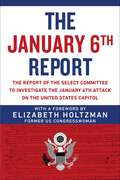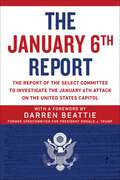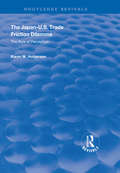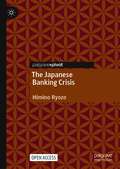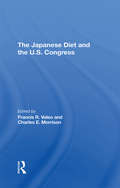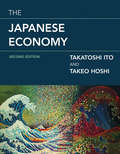- Table View
- List View
The Itinerant
by William HerrickA rowdy book; Tom Jones with a lacing of Karl Marx, as its hero plunges through the 20th century--the Depression, the Spanish Civil War, World War II--at a gallop.
The J Curve
by Ian BremmerLocate nations on the J Curve -- left for authoritarian, right for democratic. Then figure out how to force those on the left to open their societies, rather than encouraging them to shut them tighter by further isolating them. The West's isolation of Kim Jong-il's North Korea gives him the cover he needs to extend his brutal regime (the mistake the U.S. made for a long time with Saddam Hussein and Castro); in Saudi Arabia, western governments should encourage manageable change before the country breaks apart; they should help strengthen China's economy so it can further liberalize; they must encourage Israel to decide what kind of country it will be. Filled with imaginative and surprising examples of how to correct outworn political ideas, The J Curve points the way for western governments to lead the way to a realistic political balance and a healthier economic future.
The JDC at 100: A Century of Humanitarianism
by Atina Grossmann Elissa Bemporad Maud S. Mandel Avinoam Patt Linda G. Levi Mikhail Mitsel Jaclyn Granick Suzanne D. Rutland Veerle Vanden Daelen Laura Hobson Faure Anna Sommer Schneider Kierra Crago-Schneider Inga Veksler Marion Kaplan Kaplan Rakefet Zalashik Zhava Litvac GlaserThe JDC at 100: A Century of Humanitarianismtraces the history of the JDC—an organization founded to aid victims of World War I that has played a significant role in preserving and sustaining Jewish life across the globe. The thirteen essays in this volume, edited by Avinoam Patt, Atina Grossmann, Linda G. Levi, and Maud S. Mandel, reflect critically on the organization’s transformative impact on Jewish communities throughout the world, covering topics such as aid for refugees from National Socialism in Cuba, Shanghai, Tehran, the Dominican Republic, France, Belgium, and Australia; assistance to Holocaust survivors in Displaced Persons camps for rebuilding and emigration; and assistance in Rome and Vienna to Soviet Jewish transmigrants in the 1970s. Despite the sustained transnational humanitarian work of this pioneering non-governmental organization, scholars have published surprisingly little devoted to the history and remarkable accomplishments of the JDC, nor have they comprehensively explored the JDC’s role on the ground in many regions and cultures. This volume seeks to address those gaps not only by assessing the widespread impact of the JDC but also by showcasing the richness and depth of the JDC Archives as a resource for examining modern Jewish history in global context. The JDC at 100 is addressed to scholars and students of humanitarian aid, conflict, displacement, and immigration, primarily in Jewish, European, and American history. It will also appeal to readers with a more general interest in Jewish studies and refugee studies, Holocaust museum professionals, and those engaged in Jewish and other relief and resettlement programs.
The JDP and Making the Post-Kemalist Secularism in Turkey
by Pinar KandemirThis book is an analytical study of secularism in contemporary Turkey by tracing its historical trajectory within the context of political transformation in a country that experienced a social and cultural rupture in its formative years. Its principal focus is on the policies and practices of the current ruling party, the Justice and Development Party (JDP), which has influenced the process of change, evolution, and transformation with regard to secularism and state policies toward religion. Following its foundation in 2001, the JDP developed a unique approach to conceptualising the relationship between state and religion. In contrast to other mainstream parties and political positions both in the past and present, it offers an alternative vision and model to that of inherited Kemalist secularism, as formulated by Mustafa Kemal Ataturk (the founder of modern Turkey) and refined by his close associates in the formative period of the Republic. The project draws its findings from in-depth interviews with members of political parties, civil society activists and religious leaders.
The JFK Assassination: Probe Magazine On Jfk, Mlk, Rfk, And Malcolm X
by Oliver Stone James DiEugenioIn this updated and revised edition, James DiEugenio dissects the new Oscar-nominated film, The Post, and how it disingenuously represents the Pentagon Papers saga, to the detriment of the true heroes of the operation. The story of the film stems from the failed attempt of Academy Award–winning actor Tom Hanks and producer Gary Goetzman to make Vincent Bugliosi’s mammoth book about the Kennedy assassination, Reclaiming History, into a miniseries. He exposes the questionable origins of Reclaiming History in a dubious mock trial for cable television, in which Bugliosi played the role of an attorney prosecuting Lee Harvey Oswald for murder, and how this formed the basis for the epic tome. JFK: The Evidence Today lists the myriad problems with Bugliosi’s book and explores the cooperation of the mainstream press in concealing many facts during the publicity campaign for the book and how this lack of scrutiny led Hanks and Goetzman—cofounders of the production company Playtone—to purchase the film rights. DiEugenio then shows how the failed film adapted from that book, entitled Parkland, does not resemble Bugliosi’s book and examines why. This book reveals the connections between Washington and Hollywood, as well as the CIA influence in the film community today. It includes an extended look at the little-known aspects of the lives and careers of Bugliosi, Hanks, and Goetzman. JFK: The Evidence Today sheds light on the Kennedy assassination, New Hollywood, and political influence on media in America.
The JFK Conspiracy: The Secret Plot to Kill Kennedy—and Why It Failed
by Brad Meltzer Josh MenschINSTANT NEW YORK TIMES BESTSELLERFrom the New York Times bestselling authors of The Nazi Conspiracy and The Lincoln Conspiracy comes a true, little-known story about the first assassination attempt on John F. Kennedy, right before his inauguration.Kennedy, the thirty-fifth president of the United States, is often ranked among Americans’ most well-liked presidents. Yet what most Americans don’t know is that JFK’s historic presidency almost ended before it began—at the hands of a disgruntled sociopathic loner armed with dynamite.On December 11, 1960, shortly after Kennedy’s election and before his inauguration, a retired postal worker named Richard Pavlick waited in his car—a parked Buick—on a quiet street in Palm Beach, Florida. Pavlick knew the president-elect’s schedule. He knew when Kennedy would leave his house. He knew where Kennedy was going. From there, Pavlick had a simple plan—one that could’ve changed the course of history.Written in the gripping, page-turning style that is the hallmark of Brad Meltzer and Josh Mensch’s bestselling series, this is a slice of history vividly brought to life. Meltzer and Mensch are at the top of their game with this brilliant exploration of what could’ve been for one of the most compelling leaders of the 20th century.
The Jack Smith Report: Final Report on Efforts to Interfere with the Lawful Transfer of Power Following the 2020 Presidential Election by Donald Trump and Others
by Jack SmithThe full, unexpurgated final report of special prosecutor Jack Smith, regarding his two-year investigation of Donald Trump for attempting to overturn the results of the 2020 presidential election.The evidence from the investigation includes grand jury testimony from 55 witnesses, interviews by Smith&’s criminal investigators with over 250 people, photographs, information from electronic devices and online records—including Trump&’s social media account—and more.&“Our work rested upon the fundamental value of our democracy that we exist as &‘a government of laws, and not of men . . .&’ Simply put: the Department of Justice&’s guiding mandate, which my Office strove to uphold, is that power, politics, influence, status, wealth, fear, and favor should not impede justice under the law . . . My Office had one north star: to follow the facts and law wherever they led. Nothing more and nothing less . . . But for Mr. Trump&’s election and imminent return to the Presidency, the Office assessed that the admissible evidence was sufficient to obtain and sustain a conviction at trial.&” —From Jack Smith&’s Cover Letter to Attorney General Merrick GarlandThe Jack Smith Report continues Melville House's "tradition of publishing pivotal public documents."—The New York Times
The Jail is Everywhere: Fighting the New Geography of Mass Incarceration
by Judah Schept Jack Norton Lydia Pelot-HobbsA VITAL COLLECTION FROM A KEY BATTLEGROUND IN THE ABOLITION STRUGGLE: THE COUNTY JAILNearly every county and major city in the United States has a jail, the short-term detention center controlled by local sheriffs that funnels people into prisons and long-term incarceration. While the growing movement against incarceration and policing has called to reform or abolish prisons, jails have often gone unnoticed, or in some cases seen as a "better" alternative to prisons."Yet jails, in recent decades, have been the fastest-growing sector of the US carceral state. Jails are widely used for immigrant detention by ICE and the U.S. Marshals and as a place to offload people that prisons can't hold. As jails grow, they transform the region around them, and whole towns and small cities see health care, mental health care, substance abuse, and employment opportunities taken over by carceral concerns.If jails are everywhere, resistance to jails is too. The recent jail boom has sparked a wealth of local activist struggles to resist and close jails all across the United States, from rural counties to major cities. The Jail Is Everywhere brings these disparate voices together, with contributions from activists, scholars, and expert journalists describing the effects of this quiet jail boom, mapping the growth of the carceral state, and sharing strategies from recent fights against jail construction to strengthen struggles against jailing everywhere.With a foreword by Ruth Wilson Gilmore.
The Jailhouse Lawyer
by Calvin Duncan Sophie Cull&“Duncan&’s story is so incredible it strains belief. It is so heartwarming and hopeful that it will stay with you for a long time.&” —John Grisham"This brilliantly told story—at once maddening and miraculous—is among the most powerful indictments of our criminal justice system I&’ve ever read.&” —James Forman, Jr.A searing and ultimately hopeful account of Calvin Duncan, &“the most extraordinary jailhouse lawyer of our time&” (Sister Helen Prejean), and his thirty-year path through Angola after a wrongful murder conviction, his coming-of-age as a legal mind while imprisoned, and his continued advocacy for those on the insideCalvin Duncan was nineteen when he was incarcerated for a 1981 New Orleans murder he didn&’t commit. The victim of a wildly incompetent public defense system and a badly compromised witness, Duncan was left to rot in the waking nightmare of confinement. Armed with little education, he took matters into his own hands.At twenty-one, he filed his first motion from prison: &“Motion for a Law Book,&” which launched his highly successful, self-taught legal career. Trapped within this wholly corrupted system, Duncan became a legal advocate for himself and his fellow prisoners as an inmate counsel at the infamous Louisiana State Penitentiary, Angola. Literature sustained his hope, as he learned the law in its shadow.During his decades of incarceration, Duncan helped hundreds of other prisoners navigate their cases, advocating for those the state had long since written off. He taught a class in the midst of Angola to empower other incarcerated men to fight for their own justice under the law. But his own case remained stalled. A defense lawyer once responded to Duncan&’s request for documents: &“You are not a person.&”Criminal justice reform advocate Sophie Cull met Duncan after he was finally released from prison; he began to tell her his story. Together, they&’ve written a bracing condemnation of the criminal legal system, and an intimate portrait of a heroic and brilliant man&’s resilience in the face of injustice.
The Jakarta Method: Washington's Anticommunist Crusade and the Mass Murder Program that Shaped Our World
by Vincent BevinsNAMED ONE OF THE BEST BOOKS OF THE YEAR BY NPR, THE FINANCIAL TIMES, AND GQ&“A radical new history of the United States abroad&” (Wall Street Journal) which uncovers U.S. complicity in the mass-killings of left-wing activists in Indonesia, Latin America and around the world In 1965, the US government helped the Indonesian military kill approximately one million innocent civilians—eliminating the largest Communist Party outside China and the Soviet Union and inspiring other copycat terror programs. In this bold and comprehensive new history, Vincent Bevins draws from recently declassified documents, archival research, and eyewitness testimony to reveal a shocking legacy that spans the globe. For decades, it&’s been believed that the developing world passed peacefully into the US-led capitalist system. The Jakarta Method demonstrates that the brutal extermination of unarmed leftists was a fundamental part of Washington&’s final triumph in the Cold War.
The Jamaat Question in Bangladesh: Islam, Politics and Society in a Post-Democratic Nation (Politics in Asia)
by Md Saidul Islam Syed Serajul IslamThe Jamaat Question in Bangladesh addresses the complex intersection of global politics and local dynamics in Bangladesh, particularly in relation to Bangladesh Jamaat-e-Islami (Jamaat). With multidisciplinary insights and perspectives, the contributors to this volume provide an objective socio-historical analysis of Islam, politics and society in Bangladesh. Separating fact from fiction, they attempt to uncover the truth about Jamaat, the largest Islam-based political party in the country. Suppressed and marginalized by the BAL regime, Jamaat remains active in the social landscape of Bangladesh. What makes Jamaat so resilient against all odds? Can it peacefully coexist with rival political parties in a polarised nation such as Bangladesh? This book seeks to answer these crucial questions. An essential read for those interested in Bangladeshi politics and political Islam.
The James Ryker Trilogy: The Red Cobra, The Black Hornet, and The Silver Wolf (The James Ryker Series)
by Rob SinclairThree unmissable espionage thrillers in one great-value ebook. “If you love the Bourne series then you absolutely have to read the James Ryker series.” —My Chestnut Reading TreeThe Red CobraEx-intelligence agent James Ryker wants nothing more than to start a new life away from chaos, violence, destruction and deceit. But his short-lived idyll is destroyed when the fingerprints of a murdered woman in Spain match those of a former adversary who’s been missing and presumed dead for years: an infamous female assassin.“Will grab you round the throat and not let you go until the very last page, with an OMFG ending . . . a must read for fans of Lee Child and Robert Ludlum.” —Chelle’s Book ReviewThe Black HornetWhat do you do when the love of your life vanishes without a trace? If you’re James Ryker you search for the answers whatever the cost, however much blood and sacrifice it takes—even if it means getting on the wrong side of a notorious Mexican drug lord. “With yet more twists and turns this is another action packed read that is a commendable follow up to what was an amazing start to a series.” —bytheletterbookreviewsThe Silver WolfFollowing the trail of his missing wife from the crystal waters of Mexico’s Caribbean coast back to England, the country of his birth, Ryker discovers more than even he bargained for. The faint clues to many events in his recent past are all seemingly linked to one mysterious character: The Silver Wolf.“It has everything you’d want in an espionage thriller—a tight twisty plot, great characters, horrible villains and surprise twists.” —Between the Lines
The Jamesonian Unconscious: The Aesthetics of Marxist Theory
by Clint BurnhamImagine Fredric Jameson--the world's foremost Marxist critic--kidnapped and taken on a joyride through the cultural ephemera, generational hype, and Cold War fallout of our post-post-contemporary landscape. In The Jamesonian Unconscious, a book as joyful as it is critical and insightful, Clint Burnham devises unexpected encounters between Jameson and alternative rock groups, new movies, and subcultures. At the same time, Burnham offers an extraordinary analysis of Jameson's work and career that refines and extends his most important themes.In an unusual biographical move, Burnham negotiates Jameson's major works--including Marxism and Form, The Political Unconscious, and Postmodernism, or, The Cultural Logic of Late Capitalism--by way of his own working-class, queer-ish, Gen-X background and sensibility. Thus Burnham's study draws upon an immense range of references familiar to the MTV generation, including Reservoir Dogs, theorists Slavoj Zizek and Pierre Bourdieu, The Satanic Verses, Language poetry, the collapse of state communism in Eastern Europe, and the indie band Killdozer. In the process, Burnham addresses such Jamesonian questions as how to imagine the future, the role of utopianism in capitalist culture, and the continuing relevance of Marxist theory.Through its redefinition of Jameson's work and compelling reading of the political present, The Jamesonian Unconscious defines the leading edge of Marxist theory. Written in a style by turns conversational, playful, and academic, this book will appeal to students and scholars of Marxism, critical theory, aesthetics, narratology, and cultural studies, as well as the wide circle of readers who have felt and understood Jameson's influence.
The Jamestown Project
by Karen Ordahl KuppermanCapturing England's intoxication with a wider world through ballads, plays, and paintings, and the stark reality of Jamestown--for Indians and Europeans alike--through the words of its inhabitants as well as archeological and environmental evidence, Kupperman re-creates these formative years with astonishing detail.
The January 6 Report
by The January 6th CommitteeThe official report and findings of the bipartisan Congressional investigation into the January 6 attack on the Capitol, and Donald Trump’s related coup conspiracies to overthrow the election, with an original foreword by attorney and Emmy-winning MSNBC anchor Ari Melber. <p><p>This edition includes an exclusive breakdown of the coup conspiracy, based on Melber’s reporting and real-time coverage, highlighting the multi-pronged plot against democracy. Only the authoritative House committee report can capture the full range of plots that have been exposed over time, from the violent attack on January 6 to related efforts revealed months after the insurrection. This definitive edition features: • New independent analysis of the coup conspiracy by MSNBC Chief Legal Correspondent Ari Melber• The historic, official text of the House Committee report on the insurrection• The definitive accounting of Donald Trump’s efforts to end American democracy <p><p>This is the only edition of the report featuring an additional, original analysis of the coup by a journalist and lawyer at the center of the action—Melber has interviewed top members of this Committee, Jan. 6 rally planners and other cooperating witnesses, and Trump White House veterans ranging from Steve Bannon to Peter Navarro (now indicted for defying this probe). His report documents how Trump’s plots comprise a continuous coup conspiracy—not a “riot” that exploded in a “single day”—and why that factual prism is vital for accountability, justice, and preventing the next coup attempt. <p><P>In chilling detail, he shows how that process might have engineered a technical effort to “override” the election on the floor of Congress—an essential map, and warning, for those who wish to protect democracy. If warnings are ignored and there is no accountability for the plotters at the top, a failed coup may become a training exercise. This report is not only a vital document in modern American history, it can also inform efforts to protect the future of American democracy. As a matter of justice, bipartisanship, and even patriotism, this report will become essential reading for any American determined to defend our democracy. <p> <b>New York Times Bestseller</b>
The January 6th Report
by David Remnick Jamie Raskin Select Committee to Investigate the January 6th Attack on the United States CapitolCeladon Books and The New Yorker present the report by the Select Committee to Investigate the Jan 6 Attack on the United States Capitol. <p><p> On January 6, 2021, insurgents stormed the U.S. Capitol, an act of domestic terror without parallel in American history, designed to disrupt the peaceful transfer of power. In a resolution six months later, the House of Representatives called it "one of the darkest days of our democracy," and established a special committee to investigate how and why the attack happened. <p><p> Celadon Books, in collaboration with The New Yorker, presents the committee's final report, the definitive account of January 6th and what led up to it, based on more than a year of investigation by nine members of Congress and committee staff, with a preface by David Remnick, the editor of The New Yorker and a winner of the Pulitzer Prize, and an epilogue by Congressman Jamie Raskin of Maryland, a member of the committee.
The January 6th Report Executive Summary
by Select Committee on Jan 6thThe fastest way to understand the historic January 6th Report is this definitive edition of the Select Committee's Executive Summary of the Report to Investigate the January 6th Attack on the United States Capitol. The Summary is presented unedited and in its entirety, without the bias of introduction, commentary, or other punditry. <p><p> The result of thousands of interviews, testimony derived from the issuance of over 100 subpoenas, countless hours investigating telephone and internet records as well as analyzing audio, photo, and video evidence, the report uncovers an intricate scheme to overturn the results of the 2020 presidential election. <p><p> The central question of the report, answered in stunning detail here, is: How involved was the president of the United States? <p><p> Months in the making, this stark and gripping text will allow every American to learn for themselves what really happened at the Capitol of the United States on January 6th, 2021. <p><p> The Executive Summary of the January 6th Report is another in Melville House's series of carefully presented "pivotal public documents." (New York Times)
The January 6th Report: Findings from the Select Committee to Investigate the January 6th Attack on the United States Capitol
by The January 6 Select CommitteeThe official report by the Select Committee to Investigate the January 6th Attack on the United States Capitol, featuring an exclusive foreword on the state of American democracy by Congressman Adam Schiff On January 6, 2021, the United States came perilously close to losing its democracy. A mob instigated by the president of the United States violently attacked the Capitol Building in Washington, D.C., seeking to disrupt the certification of the electors in the presidential election and prevent the peaceful transfer of power for the first time in American history. The attack was the culmination of a plot organized and driven by a defeated president, attempting to remain in power through a complex web of deceit, intimidation, and violence. This is the official report of the investigation into the attack—perhaps the most vital congressional investigation in American history—with exhibits, witness testimony, and an exclusive foreword by Congressman Adam Schiff, who offers critical insights into this harrowing chapter in American history.
The January 6th Report: The Report of the Select Committee to Investigate the January 6th Attack on the United States Capitol
by Select Committee to Investigate the January 6th Attack on the US CapitolThe most important political investigation since Special Counsel Robert S. Mueller III&’s probe into Russian influence on the 2016 election of Donald J. Trump. The full report by the Select Committee to Investigate the January 6th Attack on the United States Capitol will feature facts, circumstances, and causes related to the assault on the Capitol Complex. Formed on July 1, 2021, the Select Committee has issued over one hundred subpoenas and held over a thousand witness interviews. The report will provide the results of investigations into interference with the peaceful transfer of power; the preparedness and response of the United States Capitol police and other federal, state, and local law enforcement; and the influencing factors that fomented the insurrection and attack on American representative democracy engaged in a constitutional process. The Select Committee investigation and the January 6th report will join the Mueller Report, the 9/11 Commission Report, the Warren Report, the Starr Report, and Watergate as one of the most important in history. The January 6th Report will be required reading for everyone with interest in American politics, for every 2020 voter, and every American. It is available here as an affordable paperback, featuring a foreword by Elizabeth Holtzman, a lawyer and political leader who was a Democratic Congresswoman from New York. Holtzman has a unique perspective on the situation, as she served on the House Judiciary Committee charged with investigating the Watergate scandal and prepared articles of impeachment that precipitated the resignation of President Nixon.
The January 6th Report: The Report of the Select Committee to Investigate the January 6th Attack on the United States Capitol
by Select Committee to Investigate the January 6th Attack on the US CapitolThe most important political investigation since Special Counsel Robert S. Mueller III&’s probe into Russian influence on the 2016 election of Donald J. Trump. The full report by the Select Committee to Investigate the January 6th Attack on the United States Capitol features facts, circumstances, and causes related to the assault on the Capitol Complex. Formed on July 1, 2021, the Select Committee has issued over one hundred subpoenas and held over a thousand witness interviews. The report will provides the results of investigations into interference with the peaceful transfer of power; the preparedness and response of the United States Capitol police and other federal, state, and local law enforcement; and the influencing factors that fomented the insurrection and attack on American representative democracy engaged in a constitutional process. The Select Committee investigation and the January 6th report joins the Mueller Report, the 9/11 Commission Report, the Warren Report, the Starr Report, and Watergate as one of the most important investigations in US history. The January 6th Report will be required reading for everyone with interest in American politics, for every 2020 voter, and every American.
The Japan That Can Say No
by Shintaro IshiharaAuthor describes the causes of friction between his country and the U.S., claiming that dropping the A-bomb on Japan rather than on Germany conveyed American racism.
The Japan-US Trade Friction Dilemma: The Role of Perception (Routledge Revivals)
by Karen M HolgersonFirst published in 1998, this study of Japan-U.S. trade friction and the role perceptual differences have played in its evolution differs from its predecessors in key ways. First, it is interdisciplinary, drawing on the research of anthropologists, area specialists, intercultural communication specialists, linguists, sociologists, and social psychologists as well as that of political scientists and economists. Second, it both identifies and quantifies perceptual differences between Japanese and American opinion leaders regarding the large bilateral trade imbalances, the bilateral relationship, and national negotiating styles. Third, original data were collected from completed questionnaires sent to 230 American and 230 Japanese opinion leaders from business, government, academia, and the media, who had been involved in some way with the rice, automotive, or semiconductor sectors. Fourth, the three case studies of trade friction are representative of three differing mixes of trade friction are representative of three differing mixes of trade friction causal factors and perceptual dynamics. Finally, based on the findings of this study, modest suggestions are offered on how the bilateral perceptual gap might be narrowed and trade friction diminished so that the structural and sectoral problems might more effectively be addressed. This book should be of interest to scholars, government officials, and business leaders in Japan, the United States, and other countries in the global community who are interested in bilateral relations, international economic and political affairs, and trade friction. It should also be of special interest to social psychologists and cross-cultural scholars and researchers.
The Japanese Banking Crisis
by Ryozo HiminoThis open access book provides a readable narrative of the bubbles and the banking crisis Japan experienced during the two decades between the late 1980s and the early 2000s. Japan, which was a leading competitor in the world’s manufacturing sector, tried to transform itself into an economy with domestic demand-led mature growth, but the ensuing bubbles and crisis instead made the country suffer from chronicle deflation and stagnation. The book analyses why the Japanese authorities could not avoid making choices that led to this outcome. The chapters are based on the lectures to regulators from emerging economies delivered at the Global Financial Partnership Center of the Financial Services Agency of Japan.
The Japanese Diet And The U.s. Congress
by Francis Valeo Charles E MorrisonThe Japanese Diet and the U.S. Congress have in common many of the characteristics of democratic institutions, similarities that can be seen in the way the two legislative bodies are constituted, in what they do, and in how they do it. At the same time, there are disparities that stem from each nation's unique cultural background and political experiences. Both the similarities and the differences are treated in this unique study. The authors, well-known japanese and U.S. scholars, illuminate significant factors that not only underlie the differing roles of the Diet and the Congress in the two governments and the style of each government, but also help shape the nature of the interaction between japan and the U.S.
The Japanese Economy, second edition
by Takatoshi Ito Takeo HoshiThe second edition of a comprehensive account of all the major aspects of the Japanese economy, substantially updated and expanded.This textbook offers a comprehensive, rigorous but accessible account of all the major aspects of the Japanese economy, grounding its approach in mainstream economics. The second edition has been extensively revised and substantially updated, with new material that covers Japan's period of economic stagnation between 1991 and 2010. The first edition, published in 1992, focused on Japan as a success story of catch-up economic development; this edition reflects the lessons learned from Japan's Lost Two Decades.After presenting the historical background, the book begins with macroeconomics, studying growth and business cycles. It then covers essential policy issues, with new material that takes into account the Japanese banking crisis of 1997–1998 and the global financial crisis of 2008–2009, discussing financial regulation, monetary policy, and fiscal policy. It goes on to examine saving, demography, and social security in light of Japan's ongoing demographic transition; industrial organization; labor markets; international trade and international finance; and the Japan–U.S. relationship. A new chapter offers a detailed analysis of the Lost Two Decades, synthesizing and applying concepts discussed in previous chapters and offering insights into such issues as successful catch-up growth, demographic shifts, and credit booms and busts.
